Introduction
The coronavirus pandemic is causing large-scale loss of life and severe human suffering globally. It is the largest public health crisis in living memory, which has also generated a major economic crisis, with a halt in production in affected countries, a collapse in consumption and confidence, and stock exchanges responding negatively to heightened uncertainties (MF, 2020).
The World Health Organization (WHO) first declared COVID-19 a world health emergency in January 2020; on March 11, it announced the viral outbreak was officially a pandemic, the
highest level of health emergency (Chappell, 2020). From that moment, all that happened was a big crise, around the whole world. The specialists appreciated that the world economy was affected with more than $90 trillion.
It is expected that everything that will follow will be an economic crisis that could affect us for up to 100 years. Estimates so far indicate the virus reduced global economic growth to an annualized rate of -4.5% to -6.0% in 2020, with a partial recovery of 2.5% to 5.2% projected for 2021. Global trade is estimated to have fallen by 5.3% in 2020 but is projected to grow by 8.0% in 2021 (World Trade Organization, 2021). According to a consensus of forecasts, the economic downturn in 2020 was not as negative as initially estimated, due, at least in part, to the fiscal and monetary policies governments adopted in 2020. Major advanced economies, which comprise 60% of global economic activity, are projected to operate below their potential output level through at least 2024. Compared with the synchronized nature of the global economic slowdown in the first half of 2020, the global economy has shown signs of a two-track recovery that began in the third quarter of 2020 with developed economies experiencing a nascent recovery and economic growth in developing economies lagging behind. A resurgence in infectious cases in Europe, the United States, Japan, Brazil, India, and various developing economies, renewed calls for lockdowns and curfews and threatened to weaken or delay a potential sustained economic recovery into mid to late 2021 (Jackson et al, 2021).
Job losses have been concentrated more intensively in the services sector where workers have been unable to work offsite. Some estimates indicate that 95 million people may have entered into extreme poverty in 2020 with 80 million more undernourished compared to pre-pandemic levels.
The full economic impact of the pandemic will likely remain unclear until the negative health effects peak.
Consequences of the coronavirus (COVID-19) pandemic on company activities in Romania in 2020
According to Statista reports, ten percent of companies that still ran their business could not pay their employees.
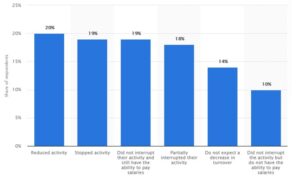
Fig. 1. Consequences of COVID-19 on company activities (Source: Statista)
Government policies to support local businesses
In 2020, Romania has activated EUR 400 million of pre-arranged financial support (Emerging Europe, 2020) from the World Bank to help prevent and respond to the Covid–19 pandemic. The financing covered a range of interventions to strengthen health services, minimized losses to both the public and private sectors and safeguarded lives and livelihoods.
Measures to support businesses, including covering the wages of the self-employed and workers in danger of being laid off partly, partially subsidizing the wages of those returning to work and deferral of utility payments for SMEs, were implemented in 2020. These measures included:
- Support of payment of technical unemployment, for employees sent into technical unemployment due to the coronavirus crisis. All employers who reduced or interrupted their activity, totally or partially, as a result of the coronavirus crisis, could apply to receive state aid for the payment of the employees in technical unemployment during the state of emergency. Employees received a compensation of 75% of the basic salary corresponding to the workplace occupied, but not more than 75% of the average gross wage forecasted for 2020 – respectively 5,429 lei, according to Law no. 6/2020 of the state social insurance budget for 2020.
- The government has decided to reimburse VAT of up to RON 9 billion (EUR 1.87 billion) to allow companies to benefit from the working capital needed to operate.
- Romania’s support program for SMEs successfully was launched on 28th April 2020, on the second try (Romania Insider, 2020).
- On July 2nd, 2020, a new scheme of financial aid in the total value of approx. EUR 800 million was approved. The support was provided in the form of state-guaranteed loans. The measures were aimed at the small and medium enterprises with a turnover of over 20 million RON in 2019 (approx. EUR 4 million), as well as for big companies.
Economic measures described above mainly targeted the impact of the lockdown, although there is a lack of confidence that the impact will reach vulnerable people, especially those working in the informal sector. Since there was a delay in the adoption of the 2021 country budget, as of March 2021, additional financial measures for business support have not been introduced.
COVID-19 pandemic’s impact on company activities in Romania: qualitative research
Research Methodology
This research is a qualitative one, conducted on a group of 10 Romanian entrepreneurs. The technique used is the in-depth interview and the tool used is the interview guide which is an unstructured interview conducted individually and the answers are noted and analyzed. The respondents have been chosen randomly and the interviews have been conducted online, face to face.
Data analysis:
Out of a total of 10 entrepreneurs, the respondents answered that they have an experience in doing business of 1-3 years (majority – 6), 3-5 years (2) and 10-20 years (2)
Of all 10 respondents, only one has experienced closing a business, the remaining 9 not closing or selling any business up until the moment of the survey. It can be concluded that through the pandemic, the entrepreneurs did not retreat from doing business.
All entrepreneurs who respond to the survey have less than 10 employees in their company and work in various fields, including agriculture, communications, IT, services.
To the question What was the most demanding challenge you had to face because of the COVID-19 pandemic and what was its solution? (For example, human resources that are not allowed to work in the office, therefore the policy work from home had to be adopted by the company), the answers were as follows.
Table 1: Challenges and solutions
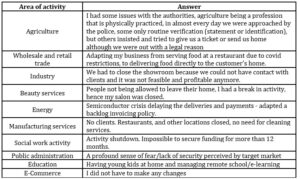
Source: Authors’ interpretation
According to the 10 respondents of the survey, the main challenges they had to face can be summarized to:
– Authorities fees and regulations
– Adaptability to the stay-at-home and work-from-home regulations (changing way of doing business)
– No demand, due to lack of clients
– Closing activity, due to lack of demand
– Having to merge personal and professional life while working from home
Another question asked to entrepreneurs was Can you expand the impact that the changes previously enlisted had on your business? (eg. The company did not have the work from home policy. We had to invest in research for work from home regulations and offsite management initiatives, but overall the WFH program was successful, the business continued to obtain expected results, and smaller amount in budget was allocated to building maintenance). The answers can be found in the table below.
Table 2: Impact on business
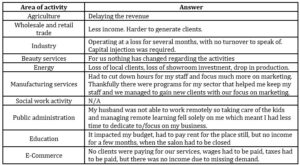
Source: Authors’ interpretation
According to the 9 respondents of the survey, the impact on their business can be summarized to the following:
- Less income
- Lack of clients
- Capital injection required
- Loss of investments
- Drop in production
- Cutting staff hours
Another question was How innovative were you as an entrepreneur? During the pandemic, a variety of activities and regulations had to change, for both individuals and companies. What is the most innovative idea you had during this pandemic and what was the level of difficulty to put it in place (easy, medium, hard)?
The answers were:
Table 3: Innovations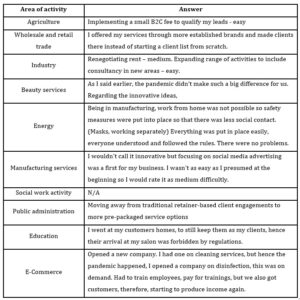
Source: Authors’ interpretation
The 9 respondents answered by pointing the innovative measure that helped them through the pandemic period. As a general result, their focus lies in diversity (diversifying way of doing business) and adaptability (adapting to the new regulations). One of the most innovative answers is that the entrepreneur saw a new market demand, and they pivoted their activity
towards that, through opening a new business.
Respondents were asked What helped you the most to pass the pandemic? (e.g. Employees’ receptiveness to change, innovative ideas, reassessment and extension of one pillar of the company’s activities, others). The answers can be found in the table below.
Table 4: What helped you the most to pass the pandemic?
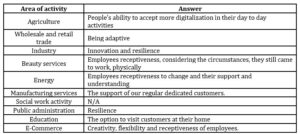 Source: Authors’ interpretation
Source: Authors’ interpretation
Based on the 9 entrepreneurs that answered the current survey, it can be concluded that the entrepreneurs were helped through this pandemic by themselves (through creativity, resilience and flexibility to adapt), by their employees (that adapted to current regulations and tried to support the company they work for) and by their customers (that were flexible to adapt to the digital environment, or changing the way of interaction with their services/ product providers).
Conclusions
Following the analysis of the qualitative data, it was found that the entrepreneurs have a plan for their business. They intend to return to the market, trying to obtain at least the same profits and market shares as before the pandemic, while being more invested in PR or marketing schemes today. Entrepreneurs understand that the pandemic is a unique situation and are trying to change the wheel in their favor, making plans to demonstrate why customers should work with them.
As a general conclusion, the COVID-19 pandemic forced the entrepreneurs to provide payments from a reduced budget, and more importantly, to be innovative and flexible to adapt to the new regulations issued at a national level. Innovative businesses will thrive in every situation; those that can’t (or won’t) innovate will die.
Acknowledgment
This paper is financed by the Politehnica University of Bucharest, “Engineer in Europe” project, identified by no. 140/GP/19.04.2021, through the Romanian Ministry of Education fund for financing special situations.
References
- Barot, H,.(2015), Entrepreneurship – A Key to Success. The International Journal of Business and Management, Vol. 3, No.1, January 2015; 163-165.
- Chen, F.W., Fu, L.W., Tsai, S.B., Su, C.H., (2018), The Influence of Entrepreneurship and Social Networks on Economic Growth-From a Sustainable Innovation Perspective. Journal of Sustainability, 10, 2510; 1-19.
- Emerging Europe, (2020), Romania activates 400 million-euro loan as World Bank begins rolling out Covid-19 support in CEE – Emerging Europe, [Online], [accessed 06.09.2021], https://emerging-europe.com/news/romania-activates-400-million-euro-loan-as-world-bank-begins-rolling-out-covid-19-support-in-cee/) (accessed 06.09.2021).
- International Monetary Fund (2021), Fiscal Monitor Database of Country Fiscal Measures in Response to the COVID-19 Pandemic, April 2021, [Online], [accessed 06.09.2021], https://www.imf.org/en/Topics/imf-and-covid19/Fiscal-Policies-Database-in-Response-to-COVID-19
- Jackson, J., Weiss, M., Schwarzenberg, A., Nelson, R., Sutter, K ., Sutherland, M., (2021), Global Economic Effects of COVID-19, Congressional Research Service, [Online], [accessed 09.2021], https://www.wita.org/atp-research/global-economic-effects-of-covid-19/
- Chappell, R.Y., Singer, P., Pandemic ethics: the case for risky research, June 2020, [Online] [accessed 09.2021], https://doi.org/10.1177/1747016120931920
- MF (2020), World Economic Outlook Update, June 2020: A Crisis Like No Other, An Uncertain Recovery, IMF, [Online], [accessed on 19.06.2021], https://www.imf.org/en/Publications/WEO/Issues/2020/06/24/WEOUpdateJune2020?utm_medium=email&utm_source=govdelivery
- Romania Insider, (2020), [accessed 11.06.2021], https://www.romania-insider.com/romania-imm-invest-platform-loans-sme-covid-19







